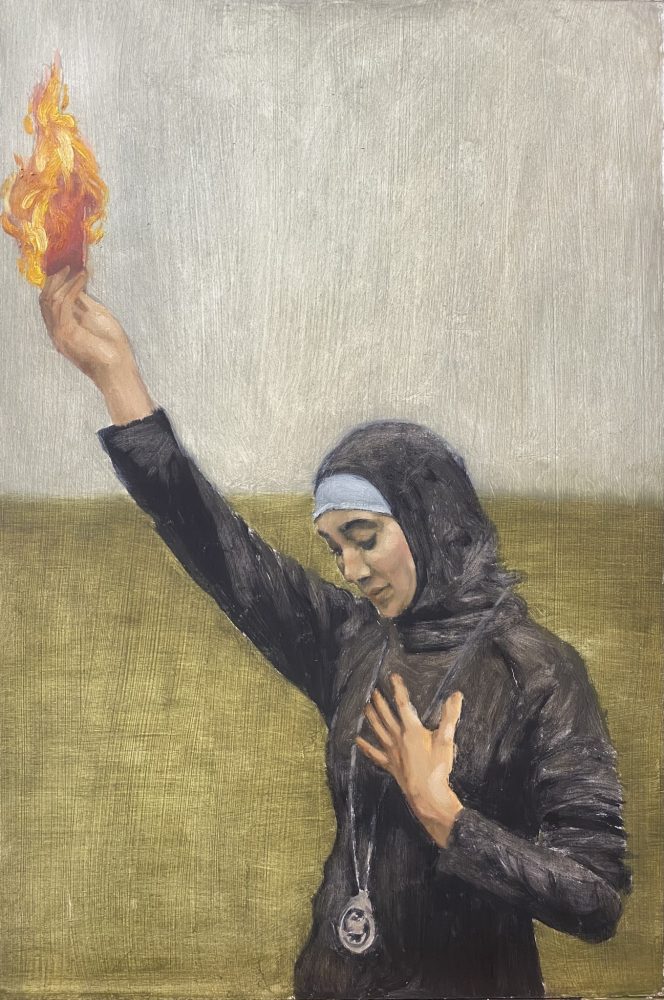Defying the Taliban through Sports
A talented athlete joins the Afghan Women's National Soccer team, despite the constant threats of death

I am Marwa, from Afghanistan. I was born in Bamiyan Province, to a relatively modern family. Although my parents were deprived of their right to an education, they always supported me, my brothers, and sisters in going to school.
Although my family always supported my education, as a young Afghan girl, I was more interested in soccer and followed women’s soccer games on TV. I was convinced that one day I would play on a soccer field. But my father was not convinced it was a good idea.
Finally, with the help of my mother, I was able to get permission from my father to join a women’s soccer team, called Hediye Maaref. But I promised that I would never appear on TV and that my soccer activities would remain a secret in my family, so that my father would not be ashamed in front of our relatives.
I started playing soccer when I was in the 10th grade. I later joined the under-15 Afghan women’s national team.
After days and nights of training, I was able to join the under-17 Afghan women’s national team and later, the under-21 national team for which I played for a year. At that time, a report spread that Keramuddin Keram, the then president of the Afghanistan Football Federation, had sexually assaulted a member of the national women’s team. The news exploded like a bomb in my family - perhaps in all female players’ families.
For a very long time, all women’s soccer activities were halted in Afghanistan.
In 2019, I had just returned from training and was heading home when a gunshot was fired behind me. I did not know who the person was, but from a distance a man threatened me. He said that I could not use the street anymore “because we don’t have a way for whore athlete girls.” For fear that my father and brothers would ban me from playing sports, I did not share the incident with them, and I never walked on that street anymore.
I became fearful but did not give up my passion for sports.
My father eventually became my greatest supporter despite the constant attacks to our family’s reputation because of my love for the sport. Unfortunately, he passed away in 2020 due to COVID-19.
After the Football Federation reopened to women and girls, I did not have a father, and my brothers did not want me to play anymore. They feared for my life, and the safety of our whole family.
Instead, I convinced them to let me join a team of female soccer referees. At the time there were only four of us. I appeared in many matches in Kabul and because of my talents, soccer coaches recommended that I participate in officiating regional and international women’s soccer games. That is how I made it to Tajikistan to officiate the CAFA U 17 Women’s Championship 2021.
At the same time, the second wave of COVID-19 took my mother away from me in 2021. After I lost my mother, I no longer knew who I was and what I should do or how to live my life.
I thought of suicide many times, but this was not the solution because I had promised my mother that one day she would proudly see me on TV. I had promised my father and mother that one day they would see me in a doctor’s white uniform, but both of them left this world before I could reach my dreams.
With many disappointments, I continued to chase my dreams by participating in the CAFA UI 7 Championship in Tajikistan as an Afghan female referee. We stayed in Tajikistan for ten days until the competition ended successfully and we then returned to Afghanistan, which gave me the feeling of hell at that time. We were recovering after the matches when the Taliban captured Kabul. We were so afraid that we did not even think of going out of the house.
At that time, I emailed the U.S. Embassy, asking them to help me and the rest of my family. With all the fear we had, we left the house and went to Kabul International Airport. At that time, passing through the airport gates was as difficult as breaking through seven mountains, and if the Taliban knew who I was, they would kill me right there without thinking about it. Eventually, we reached the gates and entered the Kabul airport with the help of American forces. After a day in the Kabul airport and nine days in a camp in Germany, we arrived in the U.S.
In today’s Afghanistan, under the Taliban regime, girls do not even have the right to go to school, let alone the ability to wear soccer jerseys and play freely.
The Taliban consider female athletes to be prostitutes with corrupt morals and their punishment is death.
If I were to return to Afghanistan, they would hang me without a second thought. There, my brother and my sister, who once played football, live in hiding under the threat of death.
Yes, I lost my parents and my country within two years, but I am still alive, hoping to achieve my dreams.
Our team members obtain informed consent from each individual before an interview takes place. Individuals dictate where their stories may be shared and what personal information they wish to keep private. In situations where the individual is at risk and/or wishes to remain anonymous, alias names are used and other identifying information is removed from interviews immediately after they are received by TSOS. We have also committed not to use refugee images or stories for fundraising purposes without explicit permission. Our top priority is to protect and honor the wishes of our interview subjects.